Introduction: Understanding Leadership and Culture
- Leadership involves exercising influence over the followers;
- Culture and leadership are the two complementary concepts (Alvesson, 2013);
- Leader’s actions determine the company’s market course;
- Organizational culture is formed by leaders’ decisions;
- Different groups perceive and value leadership differently;
- There are communities that worship autocratic leaders (Narikae, Namada, & Katuse, 2017);
- Community-centered views are not enough for leaders.
Leadership is defined as exercising influence over the followers. As Alvesson (2013) admits, the terms leadership and culture are synonymous concepts that substitute one another. Leader’s decisions determine how a company will profile itself on the market and what organizational culture will be promoted. Yet, different groups value leadership differently: the 1930s showed that autocratic management is sometimes more preferred than liberalism (Narikae et al., 2017). This fact makes one conclude that community-centered views are not enough to be a successful leader.
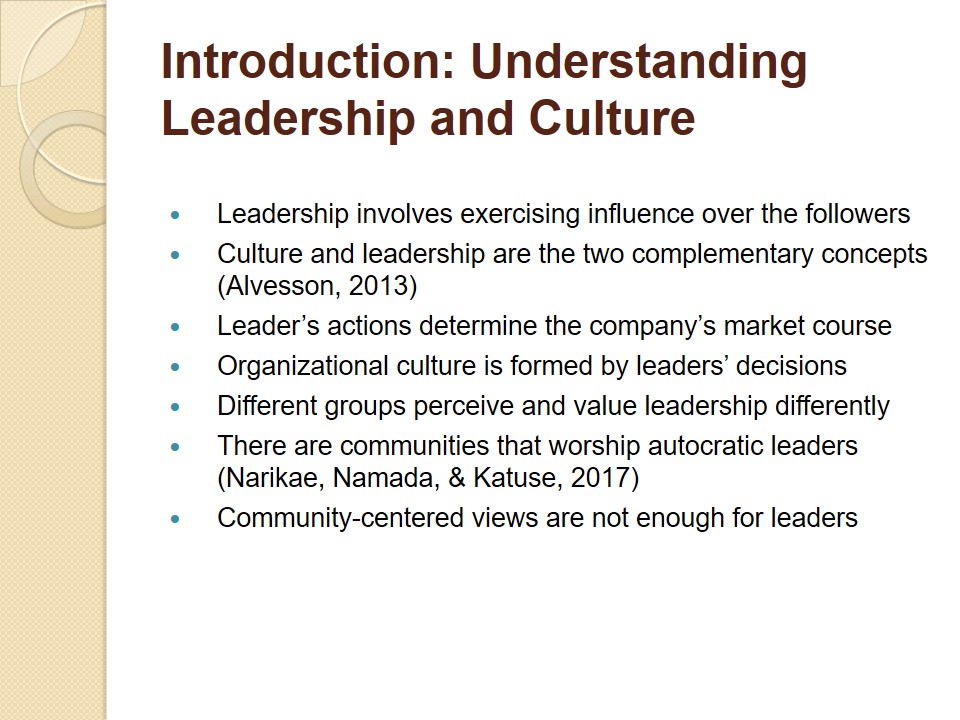
Leaders and Managers
- Leaders and managers have different business roles;
- Managers rely on their duties and professionalism;
- Leaders focus on visions and personal abilities (Alvesson, 2013);
- Successful leaders combine leadership with managerial tasks;
- Leaders change strategies according to company’s needs;
- Leadership decisions are interpreted in cultural context (Alvesson, 2013);
- Actions of leaders directly impact their subordinates.
Leaders and managers are the two concepts that are often distinguished by business analytics. Managers mostly rely on their position, engaging in all types of bureaucratic work (organizing, budgeting, planning, and more), while leaders focus more on their personal abilities, visions, and communicational skills (Alvesson, 2013). The latter, however, successfully combine leadership with the duties of a manager when adjusting market strategies to the occurring company needs. Alvesson (2013) stresses that leader’s actions are always interpreted in a cultural context since they impact all subordinates.
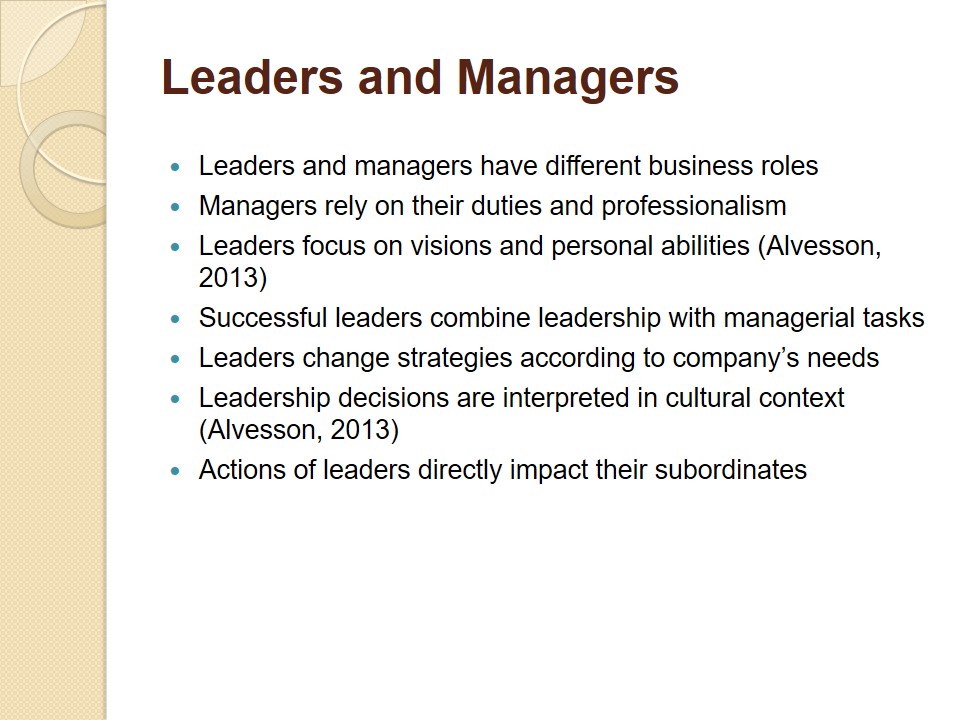
Relationship Between Leadership and Organizational Culture
- Leadership is the activity that influences culture;
- Leadership can create and change organizational atmosphere;
- Culture’s importance compares to that of leadership;
- Organizational culture can influence the company’s performance (Warrick, 2017);
- Culture-driven ideas help leaders choose proper direction;
- Culture is heavily dependent on leaders’ decisions;
- Leadership impacts company’s values and workers’ orientations (Alvesson, 2013).
In business circles, leadership is viewed as a culture-influencing activity, which possesses the strength to create and change the atmosphere within an organization. Warrick (2017) emphasizes the relevance of an organizational culture claiming that it “can significantly influence the performance and effectiveness of a company” (p. 395). Although organization-specific cultural ideas help leaders to choose the right direction, culture is still heavily dependent on leadership: the latter has a far-reaching impact on orientations and values of the entire company’s staff (Alvesson, 2013).
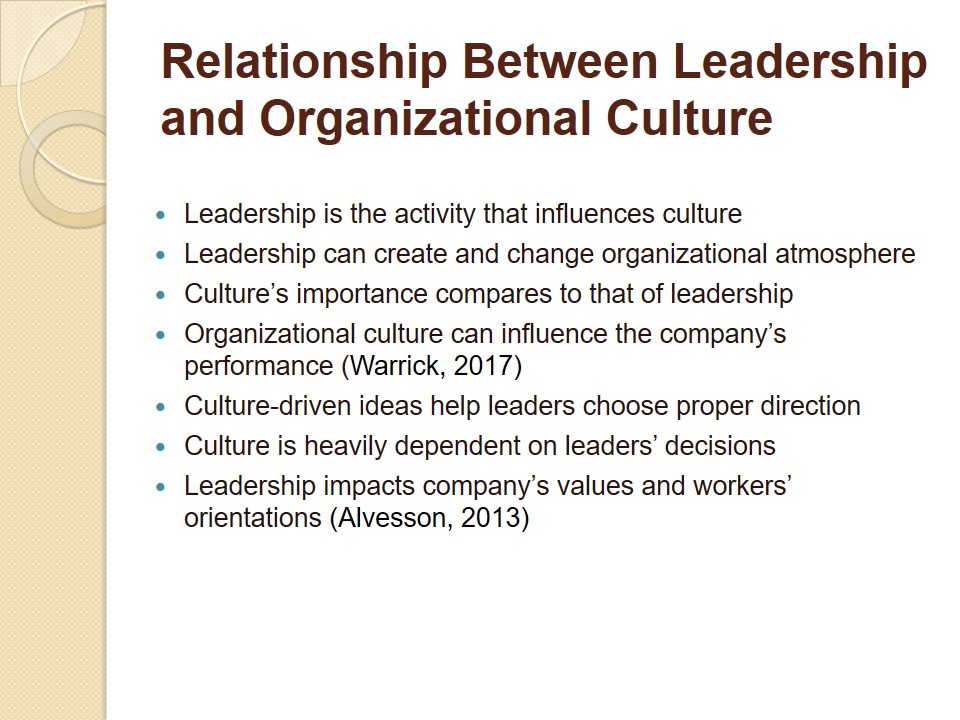
Initiator-Leadership and Follower-Leadership
- Initiator-leaders are the ones who launch projects;
- Initiators rely on their employees’ utmost support;
- Follower-leaders help the initiatives to gain development;
- CCC shows how initiator- and follower-leadership combine;
- Leaders play crucial part in motivating employees;
- CCC personnel willingly engaged in new projects (Alvesson, 2013);
- Sharing knowledge is essential for organization’s success (Kassim, Baharuddin, & Khalib, 2018).
Initiator-leaders or founders are always energetic to launch new projects; they tend to demonstrate a genuine interest in their employees’ support. Follower-leaders allow these initiatives to gain a foothold and help them achieve further development. The example of Computer Consultancy Company (CCC) shows how successful foundation and follower-leadership combine: guided by their leaders, personnel willingly engaged in all initiatives (Alvesson, 2013). The organization’s further success was attributed to the fact that the company’s leaders possessed the ability to share required knowledge (Kassim, et al., 2018).
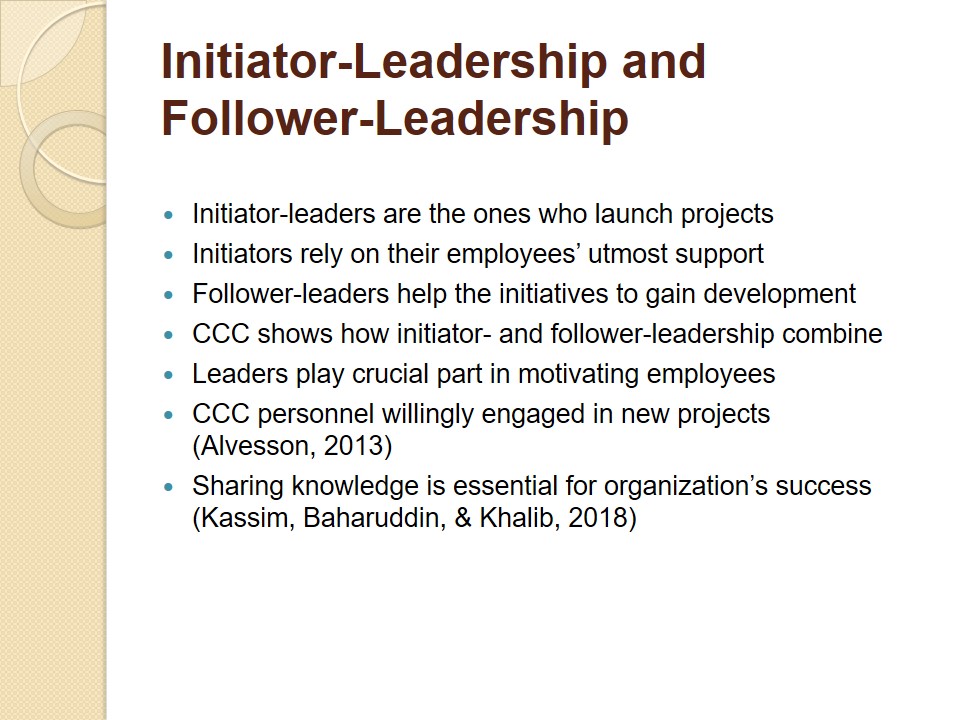
Charisma as a Culture-Building Instrument
- Charisma helps managers to win employees’ trust;
- Allows to promote changes without being criticized;
- Charismatic leaders create specific culture around themselves;
- Charisma expansion is positively associated with profit (Alvesson & Sveningsson, 2015);
- Poor performance affects the leader’s charismatic status (Alvesson, 2013);
- Charisma is only used as motivational tool;
- Strategies must never rely on character traits.
Charisma is the instrument helping managers to win employees’ trust and promote changes without being criticized. Charismatic leaders create a specific culture without excessive effort put. Leader’s charisma continues to increase for as long as the company’s operational reports ascertain profit (Alvesson & Sveningsson, 2015). However, as Alvesson (2013) indicates, “when results are no longer good, the perception of the leader as charismatic may vanish” (p.117). Therefore, this character trait should only be used as a motivational tool, not as a strategic element.
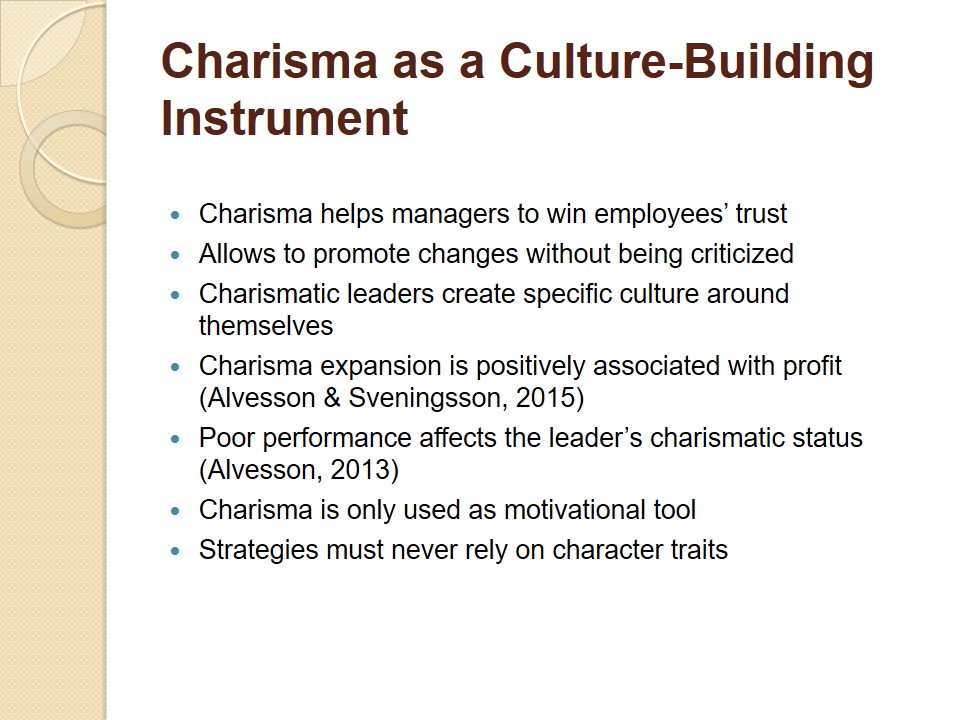
Conclusions
- Culture and leadership determine the company’s course;
- The two concepts stimulate faster knowledge transition;
- Analytics state that leadership differs from management;
- Managers rely on their position and duties;
- Leaders engage in creating specific organizational culture;
- Charisma helps leaders to establish employee-manager contact;
- It assists with promoting and implementing changes.
Leadership and culture are the two concepts that determine the company’s course on the market and stimulate the transition of knowledge. Business analytics tend to differentiate leaders and managers: the latter only rely on their position and focus on duties, while the former influence employees’ values and create a specific culture within an organization. Charisma often arrives as the tool to help leaders establish contact with subordinates and guide them during the launch of new projects. It also assists with promoting changes and altering the established cultural orientations.
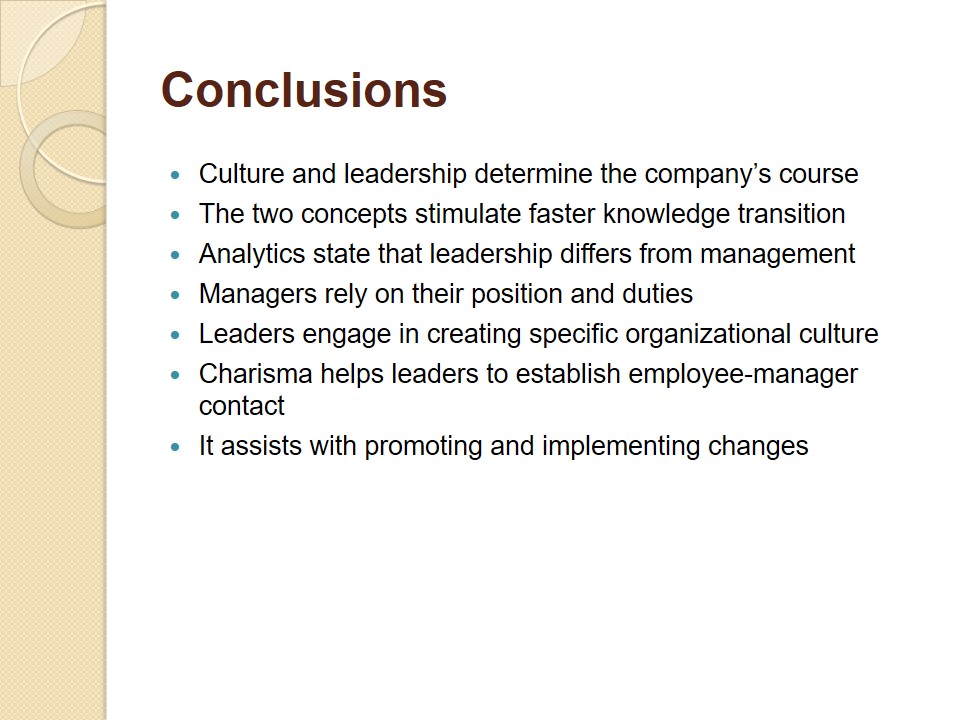
References
Alvesson, M. (2013). Understanding organizational culture (2nd ed.). London, UK: Sage.
Alvesson, M., & Sveningsson, S. (2015). Changing organizational culture: Cultural change work in progress. London, UK: Routledge.
Kassim, N. A., Baharuddin, K., & Khalib, L. H. (2018). Organizational culture and leadership as factors of organizational learning capabilities. Development, 7(3), 268-277.
Narikae, P. O., Namada, J. M., & Katuse, P. (2017). The role organizational leadership plays in strategy implementation. American Journal of Leadership and Governance, 1(1), 96-111.
Warrick, D. D. (2017). What leaders need to know about organizational culture. Business Horizons, 60(3), 395-404.